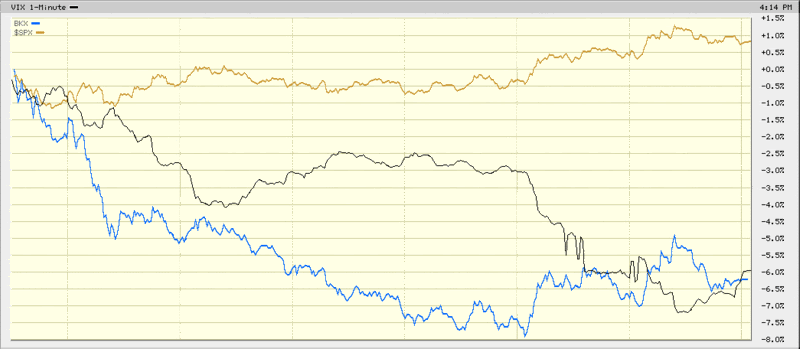When the Banks and the SPX Diverge, What Should the VIX Do?
A simple rhetorical question: what should the VIX be tracking, the SPX or the banks?
I raise this issue because for most of today’s session, the S&P 500 index was flattish, while the VIX was down several percentage points. At the same time the financials in general and the banks in particular were struggling mightily. As the chart below shows BKX, the Keefe, Bruyette & Woods banking index, which spent the bulk of the day down 6-8%.
Does the fact that the VIX fell 5.4% while the banks sold off (-5.6%) and the SPX rose (1.6%) mean that traders of SPX options are not concerned about the future of the banks? I find this hard to believe. I would love to hear some comments on this one?

[source: BigCharts]


13 comments:
Pure speculation but could the divergence have something to do with the fact that financials are down to 7-8% (???) of the SPX? Is it that the action of the financials doesn't impact the index like it did last fall?
i agree with Anon. Financials carry less weight on a day when it appears the SPX components of industrials, tech, materials, consumer discretionary, utlilities and healthcare did well while financials struggled. Perhaps the fun days of everything falling in unison and sending VIX on a rocket ride are over?? And whats up with the CPC and CPCE ratios hovering around lows?? Option players appear very bullish about a bottom here.
--dowoper8tr--
Also, part of the reason why the financials are selling off is the uncertainty regarding the "bad bank" proposal, not because of any fear of imminent collapse of one or more banks. Maybe uncertainly doesn't drive Vix as much as fear does?
Echoing the previous comment, it could be that financials matter less to investors, seeing as they have less weight in the S&P 500.
Where XOM goes, so does the SPX.
One of the problems with the banks . . . the Obama administration's tackling of the financial crisis is beginning to take on the same solution-du-jour quality that plagued Paulson. As for the SPX-BKX divergence, hard to see how you can have either a market rally or hope for an economic recovery, let alone an actual economic recovery, without the banks. One way or another the SPX-BKX correlation is going to revert to its mean. Either the banks play catch up in coming days or the market cracks and we're in for another test of the November low.
Shouldn't relative volume be a consideration in answer your question? Or relative dollar volume of trading. (Volume x price of financials)normalized / (volume x price of spx)normalized...
Whoever is driving gets the DWI ticket in real life....;)
I sort of think the vix may be able to go down at the same time the S&P are up & the banks are down because banks are only 10% of the S&P and we have got use to the banks being down. That is not to say that we can go sky high without the banks or go up for any long time frme without them. Thanks Mark
Could be be unrelated to banks...simply a case that relative complacency is on the rise - relative to where the S&P is I mean.
Another perspective.... S&P earnings for 4th quarter is being projected at $55 (the mean projection from top down). Birinyi Associates did some number crunching and came to the conclusion that if one put all financial in S&P to zero or wipe our entire earnings, S&P would have an average earnings of $85 to $90. I think, that is what market has come to terms with. All you need is tech and materials/energy to rally, and S&P will rally irrespective of financial.
1) Financial Services now only 13.28% of the S&P.
http://finance.yahoo.com/q/hl?s=SPY
2) Not all banks did poorly yesterday, but market cap may have weighed the sector.
3) These 'bad' bank holdings may have already been hedged.
4) It may be assumed by now that the long-term systemic implications of a single failure will be handled by the government.
5) We've already been through the wringing and have been innoculated against the news flow.
Just top of mind.
Good comments, all.
I have financial institutions at 10.3% of the SPX, down from a high of 22.3% in December 2006.
Statistically, banks are a smaller and smaller part of the overall investing landscape, but when it comes to decoupling, I find it hard to believe that the banks and the broader market are going to trend in opposite directions for more than a day or two.
This is one to keep an eye on, methinks.
Bill, in that regard (and this will now feel like a promo since it's my second similar post for the day BUT)... in "ETF Rewind Pro" on the Pairs Analysis sheet, just for kicks run XLF against SPY with a 5-day lookback and a band of 1.0. Regards, Jeff
Too clever by half, perhaps, but if bank stocks are warrants, then their prices should decline as volatility premiums decline.
Not unlike what happened to SCORES at year-end '87 when it became evident the road back wasn't to be fast.
Post a Comment